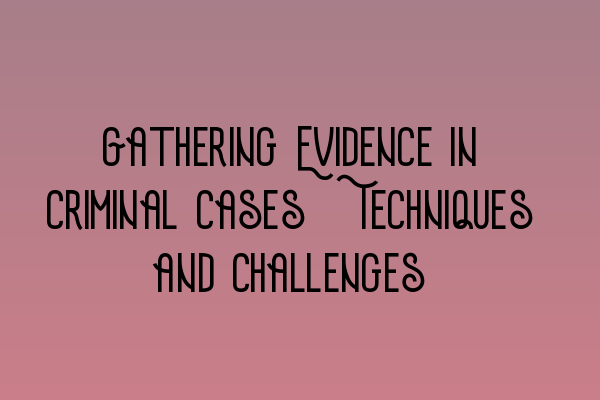Gathering Evidence in Criminal Cases: Techniques and Challenges
When it comes to criminal cases, gathering evidence plays a vital role in ensuring a fair and just trial. The evidence presented in court can make or break a case, and it is the responsibility of the solicitors and legal professionals to gather and present the strongest evidence possible to support their clients.
The Importance of Strong Evidence
Strong evidence is crucial in criminal cases as it provides the basis for proving guilt or innocence. It helps establish facts, corroborate testimonies, and ultimately, guides the decision-making process of judges and juries. Gathering strong evidence not only helps build a strong defense or prosecution case but also contributes to upholding the principles of justice and preserving public trust in the legal system.
Now, let’s explore some common techniques and challenges faced when gathering evidence in criminal cases:
1. Witness Testimonies
Witness testimonies are often key pieces of evidence in criminal cases. Solicitors must identify and interview potential witnesses to gather information relevant to the case. This may involve conducting thorough interviews, cross-examining witnesses, and ensuring their statements align with other evidence. It is essential to secure witness cooperation and establish their credibility. Additionally, solicitors should have the skills to effectively present witness testimonies in court.
Related Article: SQE Exam for International Lawyers: Challenges and Success Strategies
2. Forensic Evidence
Forensic evidence can provide invaluable support in criminal cases. DNA analysis, fingerprints, ballistics, and other scientific techniques can help link suspects to a crime scene or prove their innocence. Collecting and analyzing forensic evidence is a specialized task. Solicitors must work closely with forensic experts to ensure that proper protocols are followed during evidence collection and analysis. They also need to understand the scientific principles behind forensic evidence to effectively present it in court.
3. Documentary Evidence
Documentary evidence, such as contracts, emails, financial records, and surveillance footage, can be crucial in criminal cases. Solicitors must diligently search for and examine relevant documents to uncover evidence that supports their case. This requires analyzing complex legal documents, identifying discrepancies, and understanding the rules of evidence to ensure the admissibility of documentary evidence in court.
Related Articles: LLC Formation Made Simple: Step-by-Step Guide for UK Entrepreneurs, LLC Formation: A Step-by-Step Guide for UK Entrepreneurs
4. Digital Evidence
In today’s digital age, digital evidence has become increasingly important in criminal cases. This includes evidence gathered from computers, smartphones, social media platforms, and surveillance systems. Solicitors must be well-versed in digital forensics, understanding the technicalities of data recovery, and ensuring the integrity and authenticity of digital evidence. They must also understand the legal framework surrounding the admissibility of digital evidence in court.
Challenges in Gathering Evidence
Gathering evidence in criminal cases is not without its challenges. Some common challenges include:
1. Limited Resources
Solicitors often face resource limitations, which can hinder their ability to gather extensive evidence. Limited budgets for investigations, access to experts, and the time constraints of a trial can all impact the depth and thoroughness of evidence gathering.
2. Reluctant Witnesses
Sometimes, witnesses may be reluctant to come forward or testify due to fear, personal conflicts, or other reasons. Solicitors need to employ effective strategies to encourage witness participation and build trust, ensuring they feel comfortable and secure in providing their testimonies.
3. Complex Legal Processes
The legal processes involved in gathering evidence can be complex and time-consuming. Solicitors must navigate through various legal procedures, comply with disclosure obligations, and handle legal complexities while ensuring the admissibility of evidence in court.
Related Article: Demystifying the Solicitors Qualifying Examination Format
Conclusion
Gathering evidence in criminal cases requires expertise, attention to detail, and a thorough understanding of the legal processes. Solicitors play a crucial role in ensuring that the evidence collected is strong, reliable, and admissible in court. By employing effective techniques, overcoming challenges, and staying updated with technological advancements and legal developments, legal professionals can fulfill their duty to provide fair and effective representation for their clients.
Related Article: SQE Exam Prep: Essential Study Materials for Aspiring Solicitors
